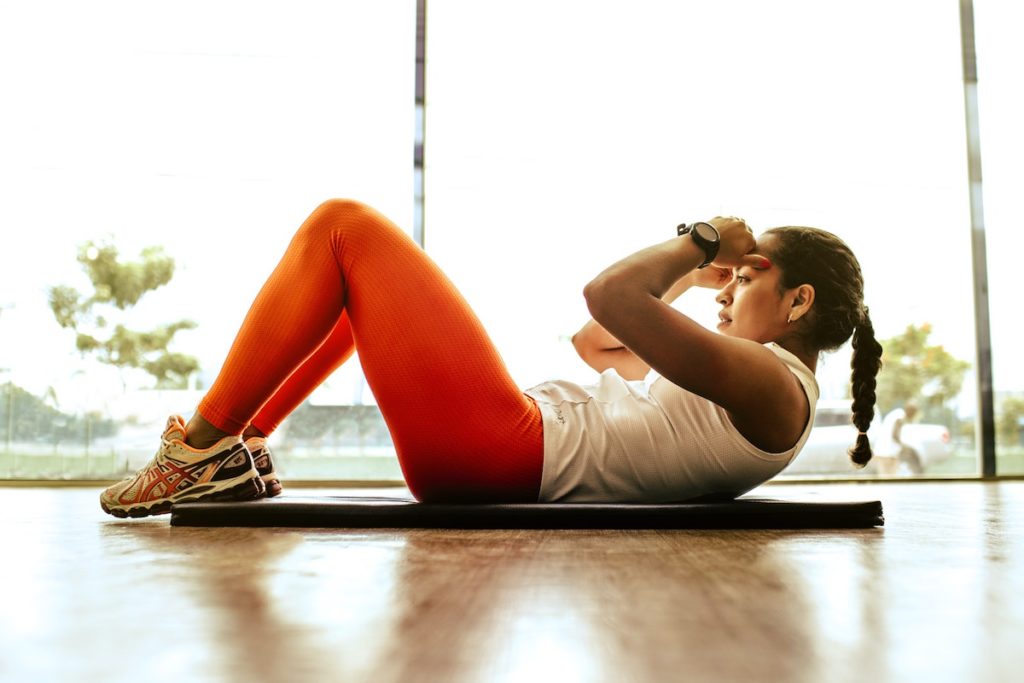Table of Contents
- Can You Workout with Hemorrhoids?
- What Are Hemorrhoids?
- Can You Exercise With Hemorrhoids?
- Good Exercises for Hemorrhoids
- Exercises to Avoid During Hemorrhoid Flare-Ups
- Tips for Working Out With Hemorrhoids
- What to Do If Hemorrhoids Don’t Go Away
- Keep It Moving!
Hemorrhoids are a royal pain. The more they hurt, the more challenging it is to do our everyday activities. We try to go about the day as usual, but what if some of our routine activities make hemorrhoid issues worse? Should we put off doing certain things until symptoms improve?
Some might welcome a break from an exercise routine (especially during the cold or hot times of the year) but many of us are quite attached to an active lifestyle.
Missing out on exercise means losing out on the benefits – the satisfaction of reaching fitness goals, the energy boosts, the endorphins, plus the emotional and mental health benefits.
Do we really have to sit it out? Read on to learn how moderate exercise with caution is not only okay but also beneficial.
Can You Workout with Hemorrhoids?
Think you’re the only one on the running trail who has dealt with hemorrhoids? You may be surprised.
Doctor Butler’s inventor, Dr. Cutler, has over 30 years of experience as a proctologist. After decades in practice, the hemorrhoids and exercise question is one he’s answered many times.
Do workouts with rapid movements make it that much worse? What about weight lifting? Does walking make hemorrhoids worse?
To better answer these questions, we start by understanding how hemorrhoids occur and what aggravates the condition.
What Are Hemorrhoids?
Hemorrhoids (also known as “piles”) are swelling veins at the wall of the rectum. The swelling is caused by too much pressure on one or more veins. Sensations of pain range from mild to intense and bleeding may occur. Other symptoms related to hemorrhoids are itching or mucus production in the anus.
Common situations that lead to hemorrhoids are obesity, pregnancy, or lifting heavy items. Bathroom issues that bring about hemorrhoids are prolonged constipation, persistent diarrhea, forcing a bowel movement, or sitting on to the toilet too long.
Minor bouts of hemorrhoids tend to clear up on their own. Once they have cleared up there are things you can do to prevent another flare-up.
Hemorrhoid Mitigation:
- Increase fiber intake
- Drink plenty of fluids
- Don’t delay bowel movements (go when you need to go)
- Avoid sitting on the toilet for too long (this tends to happen when we bring entertainment into the bathroom)
- Avoid straining
- Be hygienic (keep the anal area clean)
- Exercise (good news!)
The above are also ways to prevent hemorrhoids from getting worse. Stress reduction, sitting on a special pillow, and not sitting for longer than an hour at a time are other ways to prevent the situation from worsening.
Can You Exercise With Hemorrhoids?
Not only are hemorrhoids and exercise compatible, exercise is also recommended for therapeutic benefits.
Sitting for long periods slows the healing process, but to do something active has the opposite effect. Exercise promotes healing in the body (and prevents hemorrhoids in the first place).
Let’s keep it moving and go over what kind of exercises you can do while dealing with a hemorrhoid problem.

Good Exercises for Hemorrhoids
Exercise expedites healing by boosting blood flow and feeding the affected area with nutrients and oxygen. Also, improved circulation and strengthened muscles make bowel movements easier.
Many cardiovascular exercises are a fine choice for exercise because they get you up from the chair. Walking, running, swimming, water aerobics, an elliptical machine, a stair climber, etc. are all great ways to stay moving.
Yoga, Kegels, and pelvic floor strengthening are excellent exercises for hemorrhoids that improve abdominal and rectal muscle performance.
Just remember that when doing any activity (exercise or otherwise), avoid straining the anal muscles. Please be mindful of any movements that place any stress on the affected area.
Exercises to Avoid During Hemorrhoids Flare-Ups
Restrictions for hemorrhoids and exercise are between you and your healthcare professional.
This section is not to say that any exercises are off-limits, but doing all you can to keep the problem from getting worse makes for a faster recovery.
Some exercises involve sitting on your backside around an hour or longer. Cycling, a stationary exercise bike, horseback riding, rowing, etc.
The length of time sitting during exercise is the main concern here. For example, cycling enthusiasts rack up miles on the road with rides lasting an hour or more.
It’s recommended that cyclists either reduce the length of time of the activity, take several breaks, or switch to an alternative form of exercise temporarily. The same applies to any other exercise activities that involve sitting for a while.
The flip side of this coin is the potential for straining muscles around the anus. Weightlifters are all about pushing the limits, but you could potentially get hemorrhoids from lifting.
Gym activities that involve bearing down or tensing up muscles below the waist are likely to add further strain to an affected area. (Squats cause hemorrhoids, potentially).
With modifications to your routine, you can avoid the added pressure from prolonged sitting and further strain on the muscles.

Tips for Working Out With Hemorrhoids
As you get moving, here are some things to keep in mind.
- Stay hydrated: Working up a sweat means you need to replenish lost fluids. Not enough water intake causes constipation and hard stools that cause hemorrhoids or make them worse.
- Eat a healthy diet: The right foods help with hemorrhoids. Select those with high fiber, whole grains, a balanced diet, etc.
- Wear the right clothes: Loose breathable clothing that doesn’t create friction is ideal. Avoid anything that would irritate the affected area like thong underwear or swimsuits that ride up.
- Be clean: If you do get sweaty, be sure to clean up. Remove your sweaty clothes, wash your backside, and allow it to dry. Put on clean underwear.
While exercise contributes to healing, other common remedies help clear up the issue.
- Stool softeners or laxatives: Once you realize that you’re constipated, take care of the matter as soon as possible by using over the counter laxatives.
- Pain medication: Relieve discomfort with your choice of pain reliever.
- Sitz bath: This bath is isolated to the backside. A small plastic tub is placed in a larger tub or on top of the toilet. After you add warm water and epsom salts to the bath, you sit in it and submerge the affected area. It’s soothing and prevents new hemorrhoids from forming.
Use a High-Quality Hemorrhoid Cream
Doctor Butler’s Hemorrhoid Cream was developed by an experienced proctologist with FDA approved ingredients to both heal and soothe hemorrhoids.
Our unique cream is designed for a more effective absorption that maximizes the proprietary formula benefits. Our multi-purpose cream provides enhanced pain relief, shrinks swollen tissue, and works to stop the bleeding. The blend of herbs, minerals, and amino acids promote improved hygiene with antimicrobial properties.
Bottom line, our cream addresses several hemorrhoid issues in one step with prescription-strength pain relief and a blend of ingredients that help you heal faster. No other cream on the market compares.
What to Do If Hemorrhoids Don’t Go Away
Most cases of hemorrhoids clear up without too much trouble, but bloody stools and prolonged acute symptoms are cause for concern. Don’t hesitate to contact your physician about rectal bleeding or a hemorrhoid issue that has gone on for too long. In some advanced cases, your doctor may recommend a hemorrhoidectomy procedure to correct the issue.
Keep It Moving!
The Doctor Butler’s team is all about promoting a healthy lifestyle, so we’re delighted to deliver the good news that you can keep exercising during an unfortunate bout of hemorrhoids.
Take care of yourself. Stay hydrated, get your fiber, take laxatives when needed, stay clean, don’t strain, mind how long you’re sitting – and try Doctor Butler’s Hemorrhoid Cream!
Medical Citations
- Good, L. (2022, January 7). Weightlifting and Hemorrhoids | Livestrong. LIVESTRONG.COM. https://www.livestrong.com/article/333209-weightlifting-hemorrhoids/
- Khatri, M. (Ed.). (2022, September 18). Best and Worst Foods for Hemorrhoids. WebMD. https://www.webmd.com/digestive-disorders/best-worst-foods-hemorrhoids#1
